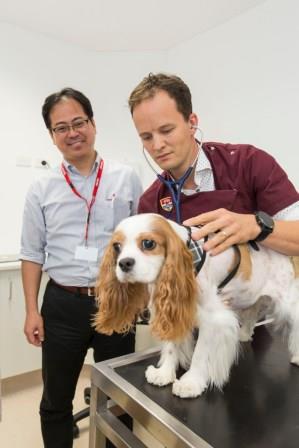Breakthrough dog surgery performed at University of Sydney School of Veterinary Science
Open-heart surgery to address the most common cardiorespiratory disease in dogs has been performed for the first time in Australia at the University of Sydney’s Veterinary Teaching Hospital.
Every year, mitral valve disease (MVD) kills thousands of dogs in Australia, and millions worldwide. There is no cure and death usually occurs within a year after symptoms of heart failure being diagnosed.

The only exception to this is a surgical procedure developed by Dr Masami Uechi, Director of Jasmine Veterinary Cardiovascular Medical Centre in Japan, which has added years to the lives of dogs affected by the condition.
Dr Uechi, accompanied by five of his surgical team, flew to Australia to perform the open-heart surgery recently with University of Sydney School of Veterinary Science specialists.
“We’re excited and grateful that Dr Uechi and his team could perform this surgery at our clinic. It is an unparalleled opportunity for us to assist with the surgery,” said Dr Niek Beijerink, the veterinary cardiology specialist who took part in the operation.
“It means that we’ll be able to start the process of learning how to perform the surgery ourselves on Australian dogs and hopefully prolong many of their lives.”
Dr Beijerink invited Dr Uechi, who he has known for many years, to come to Australia.
The six-hour operation was performed on Prince, a 10-year-old male Cavalier King Charles spaniel who was diagnosed with severe heart failure due to MVD earlier this year.
The operation was a success and promises to extend Prince’s life by many years.
“Due to the fact that this was a first-of-its-kind operation, the emotional and financial cost was high but we hope that these early first steps will eventually mean Dr Uechi’s procedure will be more accessible for dog owners in Australia who were previously left without hope if their dog was diagnosed with MVD.
“We would like to thank Dr Uechi and his team, Dr Beijerink and the staff at Sydney University for saving Prince.
“We are especially grateful that the owner of Jackson, another dog with this condition who sadly died shortly before he could be operated on alongside Prince, contributed to the costs for Prince’s surgery.”
Dr Uechi said, “This technique of mitral valve repair has been developed over 15 years. It began with open-heart surgery on cats before applying it to dogs. I have now performed over 900 operations on dogs with MVD with a 94 percent success rate.
“I’m very happy to have had the opportunity to share my knowledge with my University of Sydney colleagues and begin to teach them this technique, which will prolong the lives of many dogs in the future.”
Dr Uechi’s team will continue to liaise with the University of Sydney’s veterinary surgeons, and to visit the university in 2018.
The University of Sydney has launched a crowdfunding campaign to raise funds to support the costs associated with training their staff to develop a centre for mitral valve repair in the upcoming years.
Mitral valve disease (MVD) is caused by the wearing out of the valve that prevents blood from going backwards from the heart’s left ventricle (pumping chamber) to the left atrium (upper chamber), ultimately resulting in trouble breathing due to heart failure.
MVD is most common in middle-aged to older small- to medium-size breed dogs such as dachshunds, poodles and chihuahuas.
Veterinary Medicine at the University of Sydney
The Sydney Faculty of Veterinary Science veterinary teaching hospitals provide world-class clinical services and have the latest technology for the care of companion animals, wildlife, livestock and horses. These facilities allows the university to train the next generation of veterinary practitioners and specialists.
The Sydney DVM program encourages enrollment of students from diverse backgrounds and aims to help them achieve their goals to become veterinary medical professionals in the global community. Teaching is research-driven to ensure students learn from the latest developments and advances in evidence-based practice, veterinary science research, animal behaviour and welfare science and veterinary public health.
Program: Doctor of Veterinary Medicine (DVM)
Location: Sydney, New South Wales
Semester intake: March
Program duration: 4 years
Apply to the Sydney Veterinary School!
*



































Ask A Question
Ask us about your program of interest, or if you have a question about our services.
CONTACT US TODAY